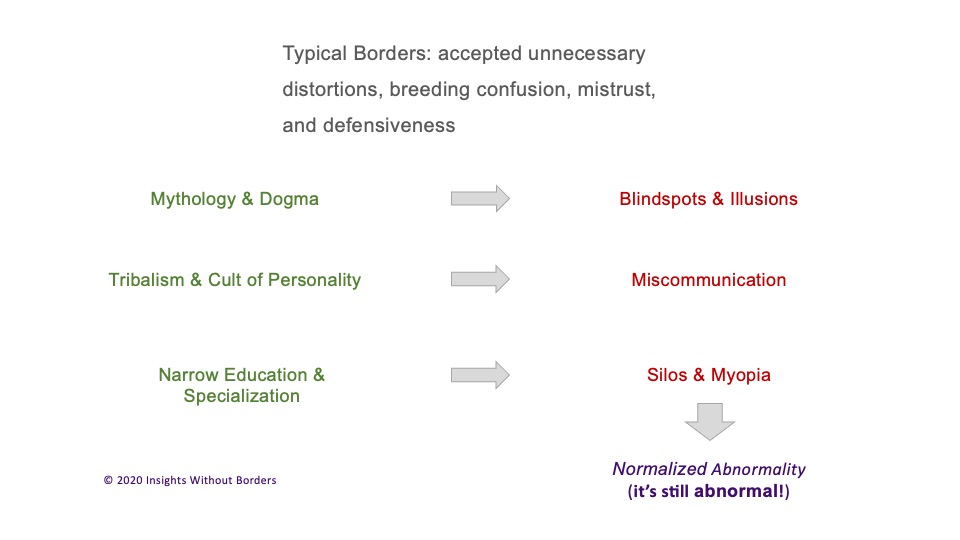
The diffused power structure, relying on a single person or even a group in a climate or culture in a business or organization, can create the temporary illusion of progress.
However, most of the challenges and opportunities businesses and organizations face in this pandemic and beyond require consistent progress over long periods.
They are badges of identity, he adds, not thought, and in a way, make thinking unnecessary—
“because they do it for you, and may punish you if you try to do it for yourself. To get along without a tribe makes you a fool. To give an inch to the other tribe makes you a sucker.”
I see this thinking and behavior in my consulting work in managing change with leaders, their line managers, and workers, who recognize their organizations as divided and categorized.
Their immediate coworkers, and their department or function, as ‘special,’ alienating workers from other ‘tribes.’ Regrettably, the very ones they must rely on to get things done.
Misplaced or Excessive Admiration
Businesses and organizations often have cult-like characteristics—influential leaders or groups who inspire mythology and dogma, devotion, and loyalty.
Who manages inward-looking culture—with stringent rules regarding behavior and intolerance of deviation (command-and-control) from the established norms?
Cult leaders and their businesses or organizations, their power lies in promoting ideas that become simple. They seem to make sense.
Unfortunately, they are the opposite of the ambiguity, contradiction, and uncertainty of day-to-day life during this pandemic and beyond.
Where teams, employees, or workers can no longer distinguish between what is real and imaginary.
Do those around boardroom tables, business, or organizational leaders, truly need (envisioned)—abridged or simplified versions of reducing behavior change management strategies, analyses, reports, and emails for immediate consumption?
That is a set of jargon-laced bullet points on dashboards and scorecards?
Or, is this doing more harm than good?
Does this sensemaking, mental modeling breeds anxiety, fear, and paranoid thinking, does it not?
Identity often has nowhere to form in opposition to hostile outside forces.
This sensemaking and mental modeling make way for ‘us’ versus ‘them’ the norm in climate and culture.
This cult-like sensemaking, mental modeling, and behavior in businesses or organizations are not known for encouraging creative thinking.
Nonconformists or rebels summarily becoming punished, are they not?
Where mythology and dogma, mind control, tribalism.
And the cult of personality is stifling the sharing of ideas, opinions, authentic, constructive criticism, and critical thinking.
We must construct bonds across these bureaucratic boundaries—instead of sanctioning silos and turf wars, tunnel vision, the threat of tribalism, and cognitive biases.
Promote leading for radical human-centricity
Where leaders, executives, employees, and workers become collaborators—in people-tech ecosystems or episodic, rotating leadership constellations—face dual demands from human centricity.
And leadership in networks of relationships are force multipliers and enablers with judgment and cross-boundary capacities (capabilities).
How smart do I want my workers to be or become?
This focus is the critical question and issues our leaders, organizational change agents, and communicators should be asking in this COVID-19 pandemic and beyond.
Silos and Myopia
Bureaucracy and silos serve a purpose.
They give clarity about teams, employees, and worker’s roles and responsibilities.
Businesses or organizations are a complex social system that sometimes performs well. And sometimes, fail miserably.
Who often can become trapped in a situation, predestined to fail from the outset?
And a reality where no one takes responsibility for these lousy systems?
Everything Is Relative
Human cognition nor behavior—mental modeling (maps and mental models) does not fit (nor should it) elegantly into boxes, categories, or silos.
Creating authentic behavior change that sticks, as I have said in this series, is not easy, fast, or linear.
Neither can you buy your way out of context, either?
Everything is relative. So is context, isn’t it?
It is priceless.
Many of you may remember this one.
Mastercard’s famous slogan, launched in 1997 that immediately caught the public’s attention?
“There are some things money can’t buy. For everything else, there’s Mastercard.”
Winning or Losing
Regrettably, a little knowledge about human cognition or behavior, managing behavior change, especially authentic behavior changes that stick, is a dangerous thing.
We often need a deeper understanding and sensemaking to innovate and breakthrough.
Unfortunately, the opposite is happening in this pandemic.
And likely, beyond, if businesses or organizations work to stay the course they are on now with how they are using more of the same traditional change management or organizational change management (OCM).
Herding blindly or dutifully change agents or practitioners—to conventional change management certification suppliers (revenue grabs) ad nauseam.
Traditional change management, as we know, it is obsolete.
Even the notion that change can be managed feels absurd given the reality and pace of business today.
Says David Michels, a partner, and director, in Bain & Company’s Zurich office.
Winning or losing is more than just a roundup of cattle on a ranch for branding or counting.

